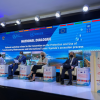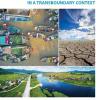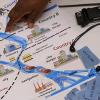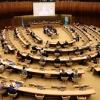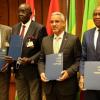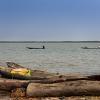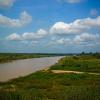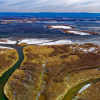Press Releases
Displaying Results 26 - 36 of 36
Uganda has 98 per cent of its water resources within the Nile River Basin. The Nile River is the longest transboundary river in Africa. Cooperation on the Nile Basin water resources, according to Uganda’s Minister for Water and Environment, His Excellency, Hon. Sam Cheptoris, is therefore “not a
Which users may use how much water of a river, lake, aquifer or other source? For what purposes, where and when?
These are the questions which a new Handbook on transboundary ‘water allocation’–which is the process and/or outcome of determining how different stakeholders use water–published under
Global estimates for financing needs for water-related investments to achieve Sustainable Development Goal 6 on water range from $6 .7 trillion by 2030 to $22.6 trillion by 2050, according to the OECD. Investments are needed not only to build new infrastructure but also to maintain and operate
Can the oft-shared, yet increasingly scarce and most precious, resource that is water be a source of cooperation, rather than of conflict, among countries? If so, then how? As climate change brings prolonged droughts and more intense floods, how will Governments cope together? More than 20
Ministers from The Gambia, Guinea Bissau, Mauritania and Senegal have agreed to establish a legal and institutional framework for cooperation on the Senegal-Mauritanian Aquifer Basin (SMAB), a shared aquifer basin (groundwater reserve) on which 80% of their populations depend. In a context of
Joining the Convention on the Protection and Use of Transboundary Watercourses and International Lakes (Water Convention) makes a difference! Parties to the Water Convention constantly advance water cooperation at the basin, subbasin and bilateral levels. The conclusion of at least 10 new
Results of the second Sustainable Development Goal (SDG) report on transboundary water cooperation, published today by UNECE and UNESCO (co-custodian agencies for SDG indicator 6.5.2) on behalf of UN-Water, suggests that not nearly enough operational arrangements for transboundary water cooperation
On 16 June, Guinea-Bissau became the 4th African country (45th party) to accede to the Convention on the Protection and Use of Transboundary Watercourses and International Lakes (Water Convention), whose secretariat is provided by UNECE. It is also a party to the Convention on the Law of the Non-
Ghana’s transboundary river basins, namely the Volta River basin (shared with Benin, Burkina Faso, Côte d’Ivoire, Mali and Togo – home to over 23 million people, with a population projected to more than double by 2050), Bia and Tano Rivers (shared with Côte d’Ivoire) and Todzie-Aka basin (shared
The use of material resources, fuelled by economic and population growth, urbanisation and societal changes, has increased more than ten times since 1900 and is set to double again by 2030. The annual global extraction of materials has increased from 27 to 92 billion tonnes since 1970, while the
Political authorities and water stakeholders from all over the world will gather in Dakar in March 2021 for the ninth World Water Forum under the theme "Water Security for Peace and Development". The Forum, co-organized by the Government of Senegal and the World Water Council, will for the first


